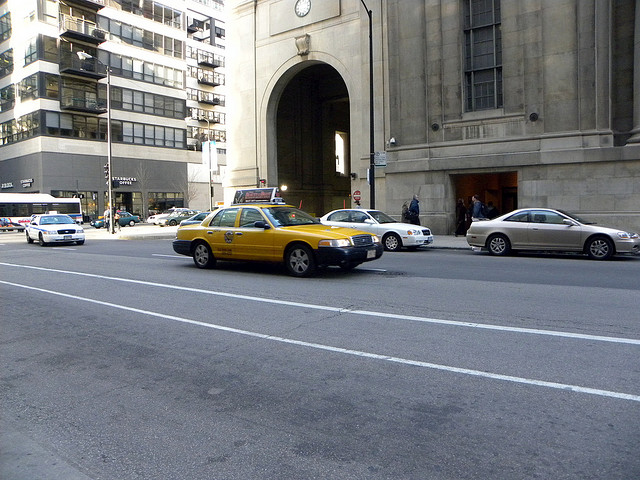Chicago Taxi Industry Releases Startling Figures Of Decline, Takes Aim At City Council
By Stephen Gossett in News on Jun 5, 2017 2:33PM

Photo credit:
As the taxi industry remains in a state of rideshare-fueled disruption, the union that represents cab drivers is painting a particularly dire picture of the business landscape, offering a new report that shows nearly half of all Chicago's cabs inactive, foreclosures on the rise and incomes plummeting for taxi drivers. The union is expected to call on City Council for a series of reforms to help reverse the downward trend.
The report—which is slated to be released on Monday by AFSCME Local 2500, the union that represents the bulk of Chicago cabbies—found that, as of March of this year, 42 percent of all of Chicago taxis were listed as inactive and were not being used on the roads.
The study also found that hundreds of medallions had been forfeited by cab drivers and owners. As of last month, 774 medallions were "surrendered" to the city as drivers struggled to keep up with local taxes and license fees, the union said. Another 579 had received foreclosure notices. More than 100 foreclosure noted had been filed since October of last year, the union-backed report found.
As more cabbies are losing medallions, those who have kept on the road have seen earnings fall precipitously: in 2013, median income per medallion was $19,000 in 2013; last year, it was a negative $4,000, according to the report, titled "Run Off The Road: Chicago's Taxi Medallion Foreclosure Crisis." The analysis also stresses that these losses affect small business owners, not just big companies like Flash and Yellow Cab. Roughly 2,7000 of all the medallions licensed in Chicago (39 percent) belong to business that own four or fewer, the report determined.
The trend is drastic if not surprising. Late last year, figures showed that the number of taxi drivers in Chicago had sunk to a 10-year low. More or less since rideshare companies like Uber and Lyft were allowed to operate in the city, in 2013, the taxi industry has cried foul at what it characterizes a two-tier system: with its operations in the market regulated far greater—and unfairly so—than its thriving rideshare competition.
You might recall that, amid threats from Uber and Lyft to pull out of Chicago, the City Council last year passed a watered-down version of its controversial rideshare ordinance. Proposed fingerprinting and disability service mandates, for instance, were put to a study rather than implemented. The Council's rules failed to tackle "the competitive disadvantage created by this administration in its two-tiered regulatory system that has destroyed family supporting jobs in the transportation industry and bankrupted thousands of hard working Chicago cab drivers," Dave Kreisman, an AFSCME communications rep, said at the time.
Given that "disadvantage," the union is expected to call for a series of reform requests from the City Council and the Department of Business Affairs and Consumer Protection, according to a first look posted by WLS.
They want the city to change the medallion code to scrap vehicle age/change of equipment requirements; get rid of the medallion license renewal fee; establish a waiver of the ground transportation tax for owners or drivers who are hurting financially; and make it easier to operate driver-to-passenger taxi hailing apps, among other regulatory reforms and foreclosure protection requests.